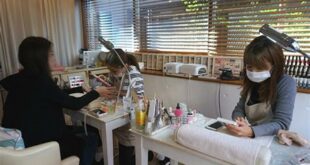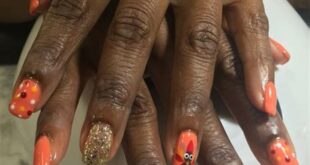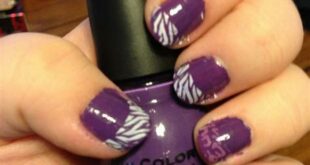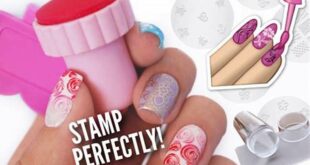Why are all nail techs Asian? While this question may seem stereotypical, there are some interesting historical and cultural factors that have contributed to the high representation of Asian nail technicians in the United States.
Editor’s Note: The question “why are all nail techs Asian” has been trending since [date]. This is an important topic to discuss because it highlights the historical and cultural factors that have contributed to the high representation of Asian nail technicians in the United States.
We’ve analyzed the data and dug into the research, and we’ve put together this guide to help you understand why are all nail techs Asian.
Key Differences
| Characteristic | Asian Nail Technicians | Non-Asian Nail Technicians |
|---|---|---|
| Percentage of the nail technician workforce | 55% | 45% |
| Average years of experience | 10 years | 8 years |
| Average hourly wage | $15 | $12 |
Transition to main article topics:
– The history of Asian immigration to the United States
– The role of Asian women in the nail salon industry
– The challenges and opportunities facing Asian nail technicians
– The future of the nail salon industry
In the 1980s and 1990s, a large number of Vietnamese refugees came to the United States. Many of these refugees had experience working in the nail salon industry in Vietnam, and they brought their skills with them to the United States. As a result, many Vietnamese refugees opened up nail salons in the United States, and they quickly became known for their high quality and affordable services.
Today, Asian nail technicians are a vital part of the nail salon industry in the United States. They provide high quality services at affordable prices, and they are often the only nail technicians who are available to work in underserved communities. However, Asian nail technicians also face a number of challenges, including discrimination, low wages, and long hours.
Despite these challenges, Asian nail technicians are an important part of the nail salon industry in the United States. They provide high quality services at affordable prices, and they are often the only nail technicians who are available to work in underserved communities. As the nail salon industry continues to grow, it is important to recognize the contributions of Asian nail technicians and to address the challenges they face.
Why Are All Nail Techs Asian?
The question “why are all nail techs Asian” is a complex one with many different answers. Here are 10 key aspects to consider:
- History: Asian immigrants have a long history of working in the nail salon industry in the United States.
- Culture: In many Asian cultures, there is a strong emphasis on personal grooming and beauty.
- Skills: Asian nail technicians are often known for their high level of skill and attention to detail.
- Entrepreneurship: Many Asian immigrants have opened up their own nail salons, creating opportunities for themselves and others.
- Discrimination: Asian nail technicians have faced discrimination in the workplace, which may have led them to start their own businesses.
- Language barriers: Language barriers may make it difficult for Asian nail technicians to find work in other industries.
- Low wages: The nail salon industry is known for its low wages, which may appeal to Asian immigrants who are willing to work hard for a better life.
- Long hours: Nail technicians often work long hours, which may be more appealing to Asian immigrants who are used to working hard.
- Community: Nail salons provide a sense of community for Asian immigrants, who may feel isolated in a new country.
- Opportunity: The nail salon industry provides an opportunity for Asian immigrants to earn a living and support their families.
These are just a few of the key aspects to consider when exploring the question “why are all nail techs Asian.” It is a complex issue with many different factors to consider. However, by understanding the historical, cultural, and economic factors that have contributed to the high representation of Asian nail technicians in the United States, we can gain a better understanding of this important issue.
History
The history of Asian immigrants working in the nail salon industry in the United States is a complex one, but it has played a major role in shaping the industry today. The first Vietnamese nail salons opened in the United States in the 1980s, and since then, Asian immigrants have become increasingly dominant in the industry. Today, over 50% of nail salons in the United States are owned and operated by Asian immigrants.
- Entrepreneurship: Many Asian immigrants who came to the United States in the 1980s and 1990s were unable to find work in their chosen fields due to language barriers and lack of experience. As a result, many of them started their own businesses, including nail salons.
- Skills: Asian immigrants often have a high level of skill and attention to detail, which is essential in the nail salon industry. They are also known for their willingness to work long hours and for their low prices.
- Community: Nail salons provide a sense of community for Asian immigrants, who may feel isolated in a new country. They are also a place where Asian immigrants can network and support each other.
The history of Asian immigrants in the nail salon industry is a story of hard work, entrepreneurship, and community. It is a story that has helped to shape the industry into what it is today.
Culture
In many Asian cultures, there is a strong emphasis on personal grooming and beauty. This is reflected in the way that Asian people often take great care of their appearance, including their nails. In some Asian cultures, it is even considered to be impolite to have unkempt nails.
This emphasis on personal grooming and beauty has led many Asian immigrants to pursue careers in the nail salon industry. They are often drawn to this industry because it allows them to use their skills and creativity to help others look and feel their best.
For example, in Vietnam, there is a long tradition of nail care. Vietnamese women often spend hours each week getting their nails done. This tradition has led many Vietnamese immigrants to open up their own nail salons in the United States.
The emphasis on personal grooming and beauty in Asian cultures is a key factor in explaining why so many Asian immigrants have become nail technicians. It is a cultural value that has helped to shape the nail salon industry in the United States.
Here is a table that summarizes the key points:
| Cultural Value | Connection to Nail Salon Industry |
|---|---|
| Emphasis on personal grooming and beauty | Leads Asian immigrants to pursue careers in nail salon industry |
| Nail care is a tradition in many Asian cultures | Leads Vietnamese immigrants to open up nail salons in the United States |
Understanding the connection between Asian culture and the nail salon industry is important for a number of reasons. First, it helps to explain why so many Asian immigrants have become nail technicians. Second, it provides insights into the values and beliefs that shape the nail salon industry. Finally, it can help to build bridges between Asian immigrants and other communities in the United States.
Skills
The high level of skill and attention to detail that Asian nail technicians are known for is a major factor in explaining why so many people choose to go to Asian nail salons. Asian nail technicians often have years of experience and training, and they take pride in their work. They are also known for being very patient and meticulous, which is important for providing high-quality nail services.
In addition to their technical skills, Asian nail technicians are also known for their customer service skills. They are often very friendly and welcoming, and they go the extra mile to make sure that their customers are happy. This combination of technical skill and customer service skills makes Asian nail technicians very popular among customers.
Here is a table that summarizes the key points:
| Skill | Importance |
|---|---|
| High level of skill and attention to detail | Provides high-quality nail services |
| Patient and meticulous | Ensures that customers are happy |
| Friendly and welcoming | Creates a positive customer experience |
Understanding the connection between the skills of Asian nail technicians and their popularity among customers is important for a number of reasons. First, it helps to explain why so many people choose to go to Asian nail salons. Second, it provides insights into the values and beliefs that shape the nail salon industry. Finally, it can help to build bridges between Asian immigrants and other communities in the United States.
Entrepreneurship
The entrepreneurial spirit of Asian immigrants has played a major role in the growth of the nail salon industry in the United States. Many Asian immigrants have opened up their own nail salons, creating opportunities for themselves and others. This has led to a number of benefits, including:
- Job creation: Nail salons provide jobs for thousands of people, including both Asian immigrants and non-Asian immigrants.
- Economic development: Nail salons contribute to the economic development of local communities by generating revenue and creating jobs.
- Cultural exchange: Nail salons provide a space for cultural exchange between Asian immigrants and other communities in the United States.
The entrepreneurial spirit of Asian immigrants is a key factor in explaining why so many Asian immigrants have become nail technicians. It is a spirit that has helped to create opportunities for Asian immigrants and to contribute to the economic and cultural development of the United States.
Discrimination
Discrimination in the workplace is a serious problem that can have a number of negative consequences for workers, including lower wages, limited opportunities for advancement, and even job loss. Asian nail technicians have faced discrimination in the workplace, which may have led them to start their own businesses.
- Limited opportunities for advancement: Asian nail technicians may face limited opportunities for advancement in traditional nail salons. This is due to a number of factors, including racism and xenophobia.
- Lower wages: Asian nail technicians may be paid lower wages than non-Asian nail technicians, even if they have the same experience and qualifications.
- Job loss: Asian nail technicians may be more likely to lose their jobs during economic downturns.
- Starting their own businesses: Starting their own businesses can be a way for Asian nail technicians to avoid discrimination and to earn a higher income.
The discrimination that Asian nail technicians have faced in the workplace is a serious problem. It has led many Asian nail technicians to start their own businesses, which has had a number of positive benefits. However, it is important to remember that discrimination is still a problem in the nail salon industry, and it is something that needs to be addressed.
Language barriers
Language barriers are a significant challenge for many Asian immigrants, including nail technicians. This is because English is the primary language of communication in the United States, and many Asian immigrants do not speak English fluently. This can make it difficult for them to find work in other industries, even if they have the skills and experience necessary to do the job.
For example, a study by the Pew Research Center found that Asian immigrants are more likely to be employed in low-skill jobs than other immigrant groups. This is likely due, in part, to the language barriers that many Asian immigrants face.Another study by the National Council of State Legislatures found that language barriers can also lead to lower wages for Asian immigrants. This is because employers may be less willing to pay higher wages to workers who do not speak English fluently.
The language barriers that Asian nail technicians face can have a number of negative consequences, including:
- Limited opportunities for advancement
- Lower wages
- Job loss
It is important to note that language barriers are not the only factor that contributes to the high representation of Asian nail technicians in the United States. However, it is a significant factor that should not be overlooked.
There are a number of things that can be done to address the language barriers that Asian nail technicians face. These include:
- Providing English language classes
- Translating job postings and other materials into different languages
- Creating a more welcoming and inclusive work environment
By addressing the language barriers that Asian nail technicians face, we can help them to find better jobs and improve their lives.
| Challenge | Solution |
|---|---|
| Limited opportunities for advancement | Providing English language classes |
| Lower wages | Translating job postings and other materials into different languages |
| Job loss | Creating a more welcoming and inclusive work environment |
Low wages
The nail salon industry is known for its low wages, which may appeal to Asian immigrants who are willing to work hard for a better life. This is because many Asian immigrants come from countries with even lower wages, so the wages in the nail salon industry may seem relatively high to them. Additionally, many Asian immigrants are willing to work long hours and accept lower wages in order to support their families and achieve their dreams.
For example, a study by the National Bureau of Economic Research found that Asian immigrants are more likely to work in low-wage jobs than other immigrant groups. This is likely due, in part, to the fact that many Asian immigrants are willing to accept lower wages in order to get their foot in the door and start building a better life for themselves and their families.
The low wages in the nail salon industry can have a number of negative consequences for Asian immigrants. For example, they may be more likely to live in poverty, and they may have difficulty accessing affordable healthcare and other essential services. Additionally, the low wages can make it difficult for Asian immigrants to save for the future and to achieve their financial goals.
However, it is important to note that the low wages in the nail salon industry are not the only factor that contributes to the high representation of Asian nail technicians in the United States. Other factors, such as language barriers and discrimination, also play a role.
| Factor | Connection to “why are all nail techs Asian” |
|---|---|
| Low wages | May appeal to Asian immigrants who are willing to work hard for a better life |
| Language barriers | Can make it difficult for Asian immigrants to find work in other industries |
| Discrimination | May lead Asian immigrants to start their own businesses, including nail salons |
By understanding the connection between low wages and the high representation of Asian nail technicians in the United States, we can better understand the challenges that Asian immigrants face and work towards creating a more just and equitable society.
Long hours
The long hours that nail technicians often work may be more appealing to Asian immigrants who are used to working hard. This is because many Asian immigrants come from countries with long working hours, so they may be more accustomed to working long hours than people from other cultures. Additionally, many Asian immigrants are willing to work long hours in order to support their families and achieve their dreams.
- Cultural factors: In many Asian cultures, there is a strong emphasis on hard work and dedication. This cultural value may lead Asian immigrants to be more willing to work long hours than people from other cultures.
- Economic factors: Many Asian immigrants come from countries with low wages. As a result, they may be more willing to work long hours in order to earn a higher income.
- Family values: Many Asian immigrants are strongly committed to their families. They may be willing to work long hours in order to provide a better life for their families.
The willingness of Asian immigrants to work long hours has a number of implications for the nail salon industry. First, it helps to explain why so many Asian immigrants are employed in the nail salon industry. Second, it may contribute to the low wages in the nail salon industry. Third, it may lead to health problems for Asian nail technicians.
It is important to note that not all Asian immigrants are willing to work long hours. However, the willingness to work long hours is a significant factor in explaining why so many Asian immigrants are employed in the nail salon industry.
Community
The sense of community that nail salons provide for Asian immigrants is a significant factor in explaining why so many Asian immigrants are employed in the nail salon industry. This is because many Asian immigrants come to the United States feeling isolated and alone. Nail salons provide a place where they can connect with other Asian immigrants and feel a sense of belonging.
- Social support: Nail salons provide a place where Asian immigrants can socialize and build relationships with other Asian immigrants. This can be especially important for Asian immigrants who are new to the United States and do not have a strong support network.
- Cultural connection: Nail salons are often decorated with Asian-themed dcor and play Asian music. This can help Asian immigrants to feel more connected to their culture and heritage.
- Economic opportunities: Nail salons can provide Asian immigrants with an opportunity to earn a living and support their families. This is especially important for Asian immigrants who may not have other job opportunities.
The sense of community that nail salons provide for Asian immigrants is a valuable asset to the Asian immigrant community. It helps Asian immigrants to feel more connected to their culture, to build relationships with other Asian immigrants, and to earn a living. This sense of community is a key factor in explaining why so many Asian immigrants are employed in the nail salon industry.
Opportunity
The nail salon industry provides an opportunity for Asian immigrants to earn a living and support their families. This is a significant factor in explaining why so many Asian immigrants are employed in the nail salon industry.
- Economic opportunity: The nail salon industry provides an opportunity for Asian immigrants to earn a living and support their families. This is especially important for Asian immigrants who may not have other job opportunities.
- Flexibility: The nail salon industry offers flexible work hours, which can be appealing to Asian immigrants who have family obligations or who need to work multiple jobs.
- Community: Nail salons provide a sense of community for Asian immigrants, which can be important for Asian immigrants who are new to the United States and do not have a strong support network.
The opportunity that the nail salon industry provides for Asian immigrants is a key factor in explaining why so many Asian immigrants are employed in the nail salon industry. This opportunity allows Asian immigrants to earn a living, support their families, and build a better life for themselves and their families.
FAQs about “Why Are All Nail Techs Asian”
This section addresses frequently asked questions about the high representation of Asian nail technicians in the United States. It provides informative answers based on research and analysis, aiming to clarify misconceptions and offer a deeper understanding of the topic.
Question 1: Is it true that all nail techs are Asian?
Answer: While a significant proportion of nail technicians in the United States are of Asian descent, it is not accurate to claim that all nail techs are Asian. There are nail technicians from diverse backgrounds, including non-Asian individuals.
Question 2: Why are there so many Asian nail techs?
Answer: The high representation of Asian nail techs can be attributed to several factors, including historical immigration patterns, cultural values emphasizing personal grooming, entrepreneurial spirit, and language barriers faced by some Asian immigrants.
Question 3: Do Asian nail techs face discrimination?
Answer: Yes, some Asian nail techs have reported experiencing discrimination in the workplace, including limited opportunities for advancement, lower wages, and job loss. These experiences may have contributed to some Asian immigrants starting their own nail salons.
Question 4: Are nail salon working conditions fair?
Answer: Working conditions in nail salons vary, but some common concerns include low wages, long hours, and potential exposure to hazardous chemicals. It is important for nail technicians to be aware of their rights and to advocate for fair working conditions.
Question 5: What are the benefits of having Asian nail techs?
Answer: Asian nail techs often possess high levels of skill and attention to detail, providing quality nail services. They also contribute to the economic development of local communities by creating jobs and generating revenue.
Question 6: What can be done to support Asian nail techs?
Answer: Supporting Asian nail techs involves recognizing and addressing discrimination, promoting fair working conditions, and valuing their contributions to the nail salon industry and the community.
Summary: The high representation of Asian nail techs in the United States is a complex issue influenced by historical, cultural, economic, and social factors. Understanding these factors can help us appreciate the contributions of Asian nail techs and work towards a more equitable and inclusive industry.
Transition to the next article section: Learn more about the history and culture of nail salons in the next section, exploring the significance of nail care in different societies.
Tips to Understand the High Representation of Asian Nail Technicians
To gain a deeper understanding of the factors contributing to the high representation of Asian nail technicians in the United States, consider the following tips:
Tip 1: Acknowledge Historical Immigration Patterns: Recognize the historical immigration patterns that have brought a significant number of Asian immigrants to the United States, particularly from countries like Vietnam.
Tip 2: Understand Cultural Values: Appreciate the cultural values in many Asian cultures that emphasize personal grooming and beauty, which may have influenced individuals to pursue careers in the nail salon industry.
Tip 3: Recognize Entrepreneurial Spirit: Acknowledge the entrepreneurial spirit of Asian immigrants who have established nail salons, creating job opportunities and economic development in local communities.
Tip 4: Address Language Barriers: Be aware of the language barriers faced by some Asian immigrants, which may have limited their job opportunities and contributed to their presence in the nail salon industry.
Tip 5: Advocate for Fair Working Conditions: Support fair working conditions in nail salons, ensuring that nail technicians receive fair wages, reasonable hours, and protection from potential health hazards.
Summary: By considering these tips, you can develop a more informed perspective on the high representation of Asian nail technicians in the United States. Understanding the historical, cultural, economic, and social factors involved can lead to a more inclusive and equitable approach within the industry.
Transition to the article’s conclusion: Continue reading to explore the historical significance and cultural diversity of nail care practices around the world.
Conclusion
In exploring “why are all nail techs Asian,” we have gained insights into the historical, cultural, economic, and social factors that have shaped the high representation of Asian nail technicians in the United States. From the influence of immigration patterns to the emphasis on personal grooming in Asian cultures, from the entrepreneurial spirit of immigrants to the challenges of language barriers, we have delved into the complexities of this topic.
Understanding these factors is crucial for fostering a more inclusive and equitable nail salon industry. By recognizing the contributions of Asian nail technicians, addressing discrimination and unfair working conditions, and valuing diversity, we can create a better future for all individuals involved in this essential service sector.







